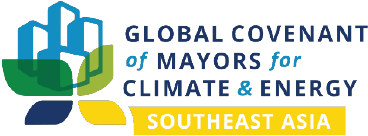Kathmandu, 5-7 December 2023 | Representing GCoM Southeast Asia (GCoM SEA) in a dynamic exchange, Kota Kinabalu, Medan, and Pontianak showcased their commitment to climate action at the GCoM South Asia Regional Workshop. In Kathmandu, Nepal, signatory cities from South Asia, Indonesia, Malaysia, Japan, and European businesses convened for this three-day event. Focused on fostering collaboration, the workshop aimed to promote innovative climate solutions and partnerships between cities and enterprises.
The workshop featured business matchmaking sessions, providing a platform for cities to articulate their climate challenges and initiatives. Notably, this initiative sought to create synergies between the interests of cities and European businesses to potentially foster collaborations and innovative solutions for climate action.
Alongside matchmaking sessions, knowledge-sharing workshops highlighted best practices from cities and insights from the City Climate Finance Gap Fund (known as “Gap Fund”). Through the Gap Fund session, participants gained insights into securing financing and building capacity, engaging in simulations to draft Expressions of Interest (EoI).
The impactful initiatives of these cities were demonstrated by the active participation of Kota Kinabalu in Malaysia, and Medan and Pontianak in Indonesia. During the workshop, Kota Kinabalu and Pontianak, as the cities chosen for the GCoM Bankable Cities’ Climate Project (known as “GCoM Bankable”), shared their experiences and action plans.
 Ms. Elsa Risfadona of Pontianak showcased their Bright Conversion Project, which would make it possible to transition to LED lights in public spaces and extend light services using solar-powered LED lighting in off-grid areas. Pontianak estimates that this plan will reduce GHG emission from the energy sector by 20.99%. With the focus on energy efficiency, this action is also in line with the national agenda to reduce GHG emissions in the energy sector. Additionally, this action plan supports Pontianak in achieving its vision of an Environmentally Sound, Smart and Dignified Equatorial City.
Ms. Elsa Risfadona of Pontianak showcased their Bright Conversion Project, which would make it possible to transition to LED lights in public spaces and extend light services using solar-powered LED lighting in off-grid areas. Pontianak estimates that this plan will reduce GHG emission from the energy sector by 20.99%. With the focus on energy efficiency, this action is also in line with the national agenda to reduce GHG emissions in the energy sector. Additionally, this action plan supports Pontianak in achieving its vision of an Environmentally Sound, Smart and Dignified Equatorial City.
Meanwhile, Mr Abdul Manaf Rajikan of Kota Kinabalu highlighted their coastal management strategies focused on achieving climate resilience and mitigation. Kota Kinabalu highlighted that a waterfront city masterplan will be utilised to carry out coastal management. Kota Kinabalu divided the plan into two main points. The first project, called the green connectivity, focuses on improving access for pedestrian and urban areas. The other initiative is a nature-based solution by enhancing the mangrove. This action also integrates with the grey infrastructure to control erosion and sea level rise. In addition, Kota Kinabalu did not forget the public participation in the action. Various social activities have been planned and conducted to promote community involvement and environmental stewardship.
resilience and mitigation. Kota Kinabalu highlighted that a waterfront city masterplan will be utilised to carry out coastal management. Kota Kinabalu divided the plan into two main points. The first project, called the green connectivity, focuses on improving access for pedestrian and urban areas. The other initiative is a nature-based solution by enhancing the mangrove. This action also integrates with the grey infrastructure to control erosion and sea level rise. In addition, Kota Kinabalu did not forget the public participation in the action. Various social activities have been planned and conducted to promote community involvement and environmental stewardship.
 Mr. Benny Iskandar of Medan presented their successful climate action on the effective use of landscape planning for decarbonisation in climate action. Medan City highlighted its action by preserving the heritage area and integrating it with increasing the greenspace area. This effort is also integrated with the Transit-Oriented Development (TOD) to increase urban mobility. With this effort, Medan has reduced the GHG emissions in sectors of energy, transport and AFFOLU. This effort also enhances the resilience from floods.
Mr. Benny Iskandar of Medan presented their successful climate action on the effective use of landscape planning for decarbonisation in climate action. Medan City highlighted its action by preserving the heritage area and integrating it with increasing the greenspace area. This effort is also integrated with the Transit-Oriented Development (TOD) to increase urban mobility. With this effort, Medan has reduced the GHG emissions in sectors of energy, transport and AFFOLU. This effort also enhances the resilience from floods.
Mr. Arif Rahmansyah Darana, speaking on behalf of the GCoM Southeast Asia Secretariat, amplified cities’ voices throughout the matchmaking process by facilitating discussions on nature-based solutions and water management.
The workshop revealed the cities’ need for increased exposure to similar platforms to enhance their capacity to develop business processes for climate action. They expressed a willingness to engage with businesses to gain valuable insights and explore climate solutions. Conversations among cities, businesses, and facilitators underscored the need for sustained engagement and follow-up actions.
As the workshop marked the initial phase of collaborative climate action, attention turned to the next steps in the matchmaking process. Participants emphasised the quest for innovative climate financing options and opportunities, emphasising the imperative of continuous interaction and collaboration among cities, businesses, and facilitators to achieve collective climate goals.
—
Written by: Arif Rahmansyah Darana
Reviewed by: Rona Ikram Putri




